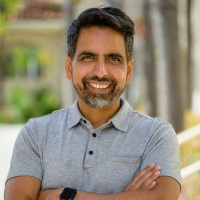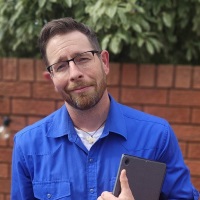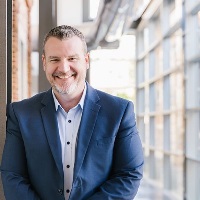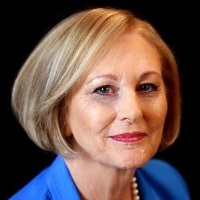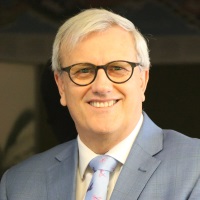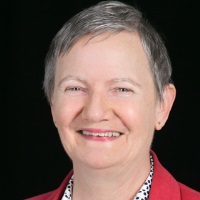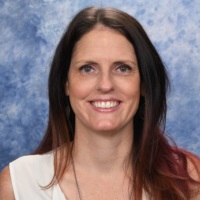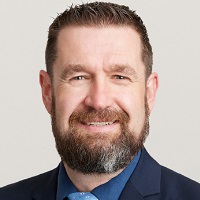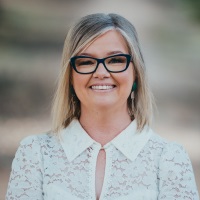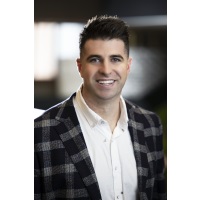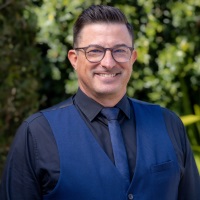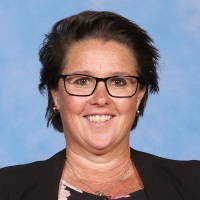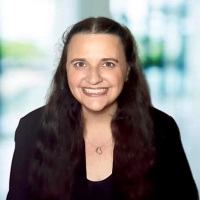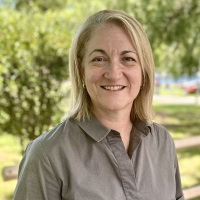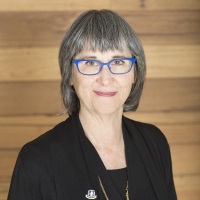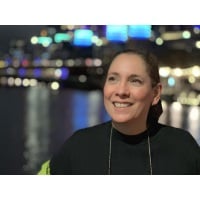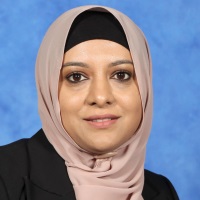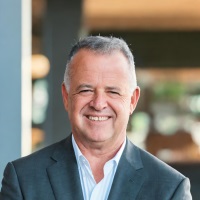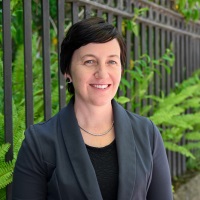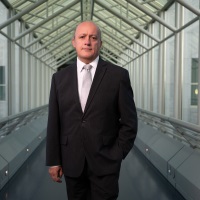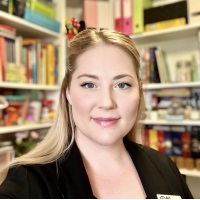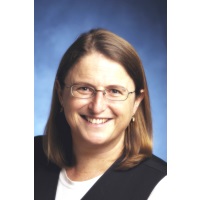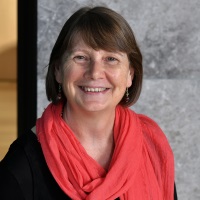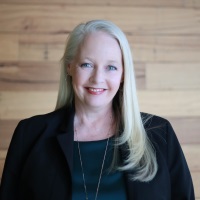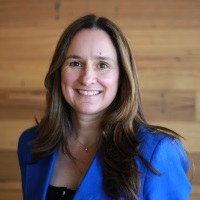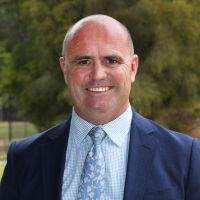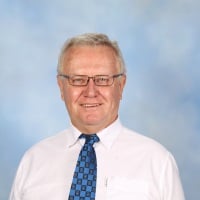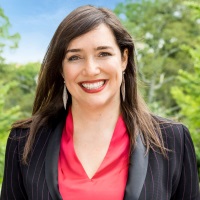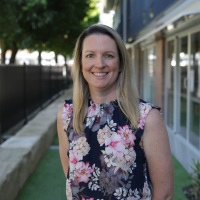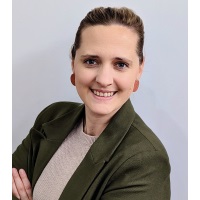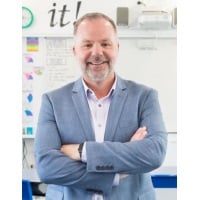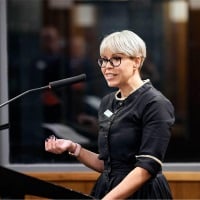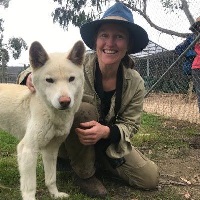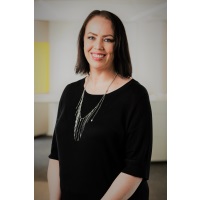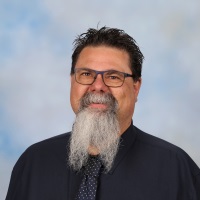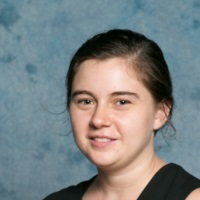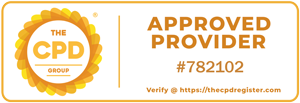AGENDA

Melbourne, 13 - 14 August 2024
Schedule
Create your personal agenda –check the favourite icon
Grand Opening - Ministerial address
Future Fixers – unlocking amazing ideas in our classrooms
Join Grok Academy’s CEO and curriculum author Dr. James Curran for a discussion on ideas that motivate students to learn new skills e.g.: an app they wished existed or solving a problem with technology. James will look at using the creative energy in the curriculum to develop the skills to make it work and why we still need to teach programming in a world where Generative AI exists.
Brave new words: How AI will revolutionize education
After the explosion of AI, teachers and parents around the world worried that it would completely undermine education as we know it. But Sal Khan, founder of the non-profit Khan Academy, says that doesn’t have to be the case. “We’re at the cusp of using AI for the biggest positive transformation that education has ever seen,” says Sal.
PANEL - The future of education in an AI powered world
Advancing Education with Google AI
AI can never replace the expertise, knowledge or creativity of an educator — but it can be a helpful tool to enhance and enrich teaching and learning experiences.When it comes to building tools for education, we are especially thoughtful and deliberate: bold technology applied responsibly.In this talk, we'll share how Google AI can help educators boost their creativity and productivity, giving them time back to invest in themselves and their students.We'll explore how learning can become even more personal, helping meet students where they are, so they can learn in ways that work for them.
The future of modern assessment
In 2022 & 2023 EduGrowth hosted a conversation on the future of modern Assessment. In 2024 the conversation continues as the landscape of assessment evolves through tech enablements and the changing needs of users and institutions alike.
Text-to-anything: The (near) future of GenAI
- Understand the concept of multimodality in GenAI and its significance in creating compelling, engaging, and persuasive content.
- Explore the implications and challenges of multimodal GenAI.
- Gain insights into the convergence of audio, video, code, 3D, gaming, apps, and VR/XR technologies in the context of GenAI.
More than ‘just’ a teacher
You are never ‘just’ a teacher. It is time to reclaim the significance of the role and impact that teachers have in all contexts and settings. It’s particularly crucial to put the spotlight back on the importance of primary school teachers – especially in the lives of children, families, and communities. The transformative power of education, guided by skilled and dedicated teachers, and educational leaders not only shapes minds but also has the potential to profoundly impact and uplift entire communities.Participants will;- be inspired and uplifted to understand the importance of a teacher- be presented with an overview of research that shows the impact of primary school settings- be encouraged to persevere and continue with a career in teaching if tempted to leave the profession- consider a long-term career in educational leadership- recognise and celebrate the pivotal role of teachers in bringing hope and transforming lives and building a brighter future for all.
Moving from AI prompting to AI fluency with large language models
Through this presentation, attendees will:1. Review and reflect on the importance of prompting with large language models, and how a few key inclusions can increase the impact of the AI output.2. Explore extensions to take prompts even further, and learn techniques to better refine and amplify your AI interactions.3. Define AI fluency, and unpack the skills and dispositions teachers and students can demonstrate to create more effective and meaningful interactions with large language models.
CIO PANEL - Cyber security & data privacy
Transforming education: Harnessing AI to improve our human intelligence
The Innovation Imperative: connecting supply and demand to solve our skills shortages
- AI is accelerating industry change and amplifying skills shortages
- How can industry & unions, education and Government come together, through an innovation approach, to solve our skills challenges
- Ideas from around the world and other industries
AI in maths
- Can Chat GPT do maths?
- Do students think Chat GPT can do maths?
- How can teachers make best use of Chat GPT and generative AI now, and in the future?
Barriers and opportunities in the future of edtech for health and physical education (HPE)
Join us and be a part of a comprehensive discussion on the future faced by HPE educators in integrating technology, including issues related to infrastructure, teacher training, and equity of access. This discussion will aim to also explore solutions and innovative practices for overcoming such barriers as experienced educators and leaders showcase such wins and challenges from their school communities.
Implementation and assessment to inform quality teacher practice in a special needs environment
How to swiftly manage complex employee relations matters in schools. Is your school’s legal and governance strategy up to scratch?
- Identifying persons and styles not suitable for working with children
- Identifying the signs, language and conduct that indicate a person poses a threat to children
- How to use innovative and lawful strategies to swiftly remove staff from your organisation who pose a risk
- How to use pre-employment checklists and questions to filter out unsuitable individuals during recruitment
Learning through play: Engaging students and teachers
- LEGO Education plays a vital role in the mission to inspire builders of tomorrow, with an ambition to enable all students to succeed by delivering engaging, hands-on, in-classroom experiences rooted in learning through play.
- This keynote aims to provide insights into how we can ensure engagement from students in classrooms as well as discuss through the key challenges that teachers face.
- Our solutions are rooted in the learning through play methodology and pedagogy before technology, which allows students to develop a holistic set of skills that are not only cognitively rooted, but also rooted in social, emotional, physical, and creative development. We empower students to find meaning in the world around them and create positive change.
Assessment realising the unique potential of each learner
Hear how EdTech is supporting educators measure the unique potential of each learner through innovated assessment models.
PANEL - Proactive strategies for developing resilience in digital education
PANEL - A culture of thinking with a teaching and learning framework
Leading first nations program ‐ Integrated virtual world
Assessment design for a time of artificial intelligence
- AI can now do much of what we have previously assessed
- We need to reconsider both what and how we assess
- Assessment needs to prepare students for a world where AI is ubiquitous
- Sometimes we need to be sure that students haven’t used AI; this is difficult but if it really matters we can do it
- This talk draws upon the major Australian project Assessment reform for a time of artificial intelligence, which was funded by the Australian higher education regulator
Authentic curriculum integration – exploring ‘creative serendipity’
In this presentation, we explore the concept of “creative serendipity” through the integration of Digital Technologies and Performing Arts (Music) learning domains into valuable cross-curricular learning experiences. Using semester-based projects from Years 5 & 6 as working examples. The presentation showcases two projects, “Battle of the bands”, and “Retro-Gamer”, from planning, through resourcing, implementation, and the culminating community events.
Take-away key points:
- The richness of combining learning domains
- The “Batte of the bands” case study project, our first iteration of explicit integration, well not quite, but back to our PBL roots post-COVID
- The “Retro-Gamer” case study project, taking what worked well, and creating something bigger!
- The value of the Maker’s Space as a form of celebrating creativity
- What happens when creative skills spontaneously appear out of expected context? Creative serendipity!
Take-away resources:
- Planning overview documentation
- Access to the “Retro-Gamer” Google Site, including workshops, resources, worksheets, and assessment checkpoints
- List of hardware and software used for showcase projects
- Integrated curriculum map (Victorian Curriculum Level 5-6) for Digital Technologies and Performing Arts (Music)
Integrating technology in primary and secondary HPE
Join us as we explore how technology and digital tools are being used across various age groups in primary and secondary Health and Physical Education for accessing information, developing skills, and engaging in creative activities. This topic would explore the factors influencing technology use, including teacher experience, geographic location, and school resources.
Embedding practices for success
Feeling the Talent Shortage? Strategies to recruit & retain top talent
- Employee Value Proposition - what is it and why do we need one?
- Talent Attraction -strategies to streamline recruitment, including leveraging your school website to attract employees.
- Onboarding/Retention - how to help new staff thrive (and stay!)
Shark Tank Heat 1
Welcome to the shark tank, where EdTech entrepreneurs with cutting edge solutions will compete to be Innovation Alley's Winner.
In this heat 4 Entrepreneurs will present their solution in the hopes of making it to the Shark Tank Final on Wednesday afternoon.
PANEL - Assessment through an AI lens. Is your assessment AI ready?
Generative AI: Today's tool for tomorrow's learners
The Generative AI: Today's tool for tomorrow's learners session will explore ways that teachers can use generative AI for teaching and learning in a safe, ethical and responsible way. Participants will engage with generative AI tools that are widely available on schools networks to understand and develop prompt literacy skills to create differentiated learning content, generate lesson plans and resources. If participants would like to trial the activities during the workshop, a previously created ChatGPT 3.5 (free) account would be beneficial.
Collaborative Intelligence: AI, students and the invisible prompt
PANEL - Technology integration of GAI – the ethical use, data governance, and the potential impacts on educational equity and accessibility
The evolving skills landscape: Anticipating current and future requirements
- Identifying and addressing current and future skill shortages in Australian organisations.
- The transition from traditional job roles to a skills-based approach and its implications for learning and development.
- The effects of skilled migration on development strategies.
Leveraging digital technologies in mathematics
Our session focuses on leveraging digital technology to design for deep learning in Mathematics. Discover innovative ways to enhance student engagement and learning outcomes through authentic technology integration. We will delve into hands-on activities, including augmented reality applications and AI, used to reinforce mathematical concepts. We will demonstrate how these technologies can transform traditional math lessons into dynamic, interactive experiences, while also highlighting cross-curricular opportunities to address literacy within the Mathematics curriculum.
Enhancing HPE engagement through educational technology
Inclusive education in STEM
This presentation will discuss designing and implementing an inclusive education programs for STEM subjects based on an evidence-based practice.
A case study of an inclusive education program for mathematics from Year 7 to 10 will be presented. This will include guidelines for acceleration and intervention, assessment of prior knowledge and assessment for learning, addressing knowledge gaps, evaluating student readiness to learn and increasing student agency.
AI reinventing the learning experience
Generative AI is transforming the way people learn. As a sector hear how we can be at the forefront of this transformation and utilise to the learners benefit.
CS education for all ages with VEX Robotics
Utilising 'playful' methods to reinforce learning and build more confident mathematicians
An anecdotal account of Stephanie’s use of wrap‐around whiteboards in Year 11 & 12 Specialist Mathematics, where students were able to work collaboratively and elucidate their thought processes throughout lessons. Stephanie will share her experience of moving away from traditional methods and giving more space to student voice, exploring the challenges faced as well as the benefits encountered along the way.
Strategies for getting better reading outcomes
Real impact for learners: A case study
Hear from an innovative EdTech company on how they are creating real and meaningful impact for their learners.
PANEL - New metrics - it's time to rethink standardised testing
Using A.I and social media tools to develop a positive student relationship with feedback, success and education
This presentation will focus on giving teachers resources and tools to make reliable, ethical and impactful feedback for their students, goals for schools who want to improve how students engage and work with feedback and celebrate success in student portals and school environments and how A.I and machine learning can assist with this.
The ideal “Security Stack” for a school
Deepening divides: How AI reinforces and creates inequities in learning
The sudden widespread availability of generative AI tools such as ChatGPT created significant opportunities and challenges for higher education. Much of the emphasis on generative AI in higher education to date has been on the risks to academic integrity. However, a more complex picture of the implications of generative AI for student learning is emerging. A new digital divide appears to be emerging. Some students are readily integrating generative AI into their learning practices while others are either not engaging or are struggling to take advantage of the power of these new technologies. AI threatens to exacerbate existing equity issues and leave disadvantaged students behind. In this session, we will explore what the emerging evidence suggests about the impact of AI on equity issues in higher education.
Optimising collaboration across TAFE, Higher Ed, and Industry to drive agile curriculum development and solve Australia’s biggest skills challenges – what are the opportunities identified, lessons lea
- Critical importance of vision and government funding
- Freedom and flexibility of non-accredited Microcredentials
- Power of collaboration for enhancing credibility, creativity, and scalability
- Balancing mutual benefit and self interest
- The challenge of re-skiller employability
Creative convergence: Exploring mathematics through art, drama, and climate impact with technology
In the "Creative Convergence" session, you'll embark on a dynamic journey at the intersection of mathematics, artistic expression, and environmental consciousness. This session is unlike any other, as it uses technology to explore mathematics through the interconnected realms of visual art, performing arts, mathematics, and climate impact. You'll discover how technology can be used to provide opportunities for students to express their creativity and explore mathematical concepts in innovative ways as you're guided through a series of students’ work samples. From mathematical drawings to financial analysis, nutrition, climate impact, and cultural awareness, you'll see how mathematics is truly everywhere. Don't miss this unique and enriching experience that will leave you with a renewed sense of inspiration and creativity.
Gamification and digital games in HPE learning
This session focuses on how digital games and gamification principles can make HPE learning more engaging and memorable, and how they cater to students with disabilities or special needs. This session will include discussing specific technologies and platforms that use gaming principles and how schools have integrated and trialled them in their settings.
Education Leadership - Differentiation and the Gifted Child
In this session, participants will gain valuable insights from a seasoned school leader, aimed at helping schools develop strategies to identify gifted children. The session will delve into the notion of the 'tall poppy syndrome' and advocate for extension activities and accceleeration that empower every child to achieve their maximum potential
FIRESIDE CHAT - Reimaging forecasting – Innovation & flexibility around budgeting
- The business manager as your most important colleague.
- Sharing your vision.
- The 3 C’s - Confide. Confer. Concur.
- Forecasting , Budgets & Benchmarking – Fact v Fantasy.
- Reimaging forecasting – Innovation & flexibility around budgeting.
Establishing your digital, data, and cyber security strategy
In 2021 Westbourne Grammar School engaged in a collaborative and consultative process creating a comprehensive digital strategy, that combined teaching, learning, infrastructure, and the business and operations functions of our school. This innovative and systematic roadmap aims to position us at the forefront of this space over the next three years.
This keynote will focus on three main areas:First, how our Digital Strategy was created, the process used, it’s launch, and how the strategy is being project managed, implemented, tracked, and reported against. I will share the successes of using a distributed leadership model and the structures and support mechanisms we have in place to drive this agenda.
Second, I will share how our data visualization and analytics framework sits within this strategy and how by developing this capability you have the potential to enhance every part of your school. Of particular note is how it can augment the visibility and nature of Executive and Board reporting through descriptive and predictive analytics and real-time visualization of key metrics and project status.
Third, the critical importance of developing your cyber security posture as an Executive and a Board, given that the ACSC are now reporting a critical cyber incident every 8 minutes in Australia. What is your current posture? Do you have a stance? What is your current maturity level as an organization? What would you do if a critical cyber incident occurred at your school? And do you have the required protocols, processes, policies, delegations, insurance, and recovery mechanisms in place?
This talk will not only highlight the critical importance of the digital, data, and cyber security triad, it will also leave the audience with key ideas that are actionable in their own context.
Leveraging technology at scale across the primary school setting
- Embracing technology for all, not just the early adopters
- Well-known hardware/software you can use with large cohorts in Primary
- No more slideshows-creative ways for students to present information
- Planning and timetabling to embedtechnology successfully
All aboard the Tinker Train: Sustainability, visible thinking & inquiry in action
Explore innovative ways in which STEAM is seamlessly integrated throughout the curriculum in this session.
Eleni will present her school's acclaimed Inquiry framework, "Strathcona's Tinker Train," showcasing how it incorporates STEAM, visible thinking, and design thinking. Witness the strategic use of technology at every stage, from the initial acquisition of new knowledge to the culmination in final assessments and showcases. Gain insights into the comprehensive process that empowers students in their learning journey, allowing them to showcase acquired knowledge while honing a diverse set of skills.
Automated security response - Security Sarah
Building complex workforce capability at scale
- Connecting the purpose of the learning ecosystem to its design
- Identifying what really matters in the ecosystem
- Why “perfect” can be the enemy of impact
- How to get the most out of partner organisations
- Practical lessons to support success in "build" and “run"
Authentic statistics: Building digital dashboards
- Teaching statistics is fundamentally different from teaching mathematics - they are separate disciplines with different rules of engagement
- Using digital tools allows us to go beyond small and inauthentic data sets where our learning focus is mostly on computation to large (messy) and authentic data where we explore appropriate interpretation and effective communication in much more depth
- Selecting the right digital tool makes a whole lot of difference - many have a steep learning curve (e.g., R, PowerBI), and many are simply too limited. Excel, while popular, is not designed for statistical analysis.
- I will share my experiences using CODAP and Tableau in Year 10 Mathematics
Technology-based student engagement strategies in HPE
Hear from inspiring teachers and how they have been exploring various technology-based activities to increase student engagement, including personalised activities, videos, and interactive tools. This session covers an array of strategies to harness technology for enhancing student interaction and learning outcomes in the HPE classroom.
Unlocking potential with assistive tech
Come along and explore some flexible, free (mostly) options to help students with literacy challenges share what they know. I’ll show you how Chatterkids, Clips and Minecraft can allow students to shine and share what they do know, all without the restrictiveness of pencil and paper.
PANEL - Strategies to enhancing operational efficiencies across finance, IT & other corporate functions
Shark Tank Heat 2
Welcome to the shark tank, where EdTech entrepreneurs with cutting edge solutions will compete to be Innovation Alley's Winner.
In this heat 4 Entrepreneurs will present their solution in the hopes of making it to the Shark Tank Final on Wednesday afternoon.
Empowering Educators: Leveraging Innovations for Classroom Enhancement
- Uncover the transformative potential of recent advancements in generative AI and technology, paving the way for highly personalised, inclusive and future-oriented educational experiences.
- Gain insights into how the implementation of an AI strategy can streamline educational processes, optimise resource allocation, and empower educators to have a profound and lasting impact on student success.
- See how Toddle AI 2.0 is tailored for school leaders to effectively leverage AI, liberating teachers from administrative burdens and allowing them to focus wholeheartedly on their core mission of teaching.
- Experience firsthand a state-of-the-art communication platform powered by artificial intelligence.
- Dive deep into the evolution of assessment methods seamlessly woven into everyday classroom routines.
Authentic curriculum integration
Building computational super powers
Structured Learning for Computational Thinking: Present a model for imparting computational thinking skills in the classroom, offering a roadmap for deeper understanding and application
Student engagement with gamification
Fostering a culture of transformation: How to lead innovation from the classroom
Hear how cultivating a culture that champions innovation and the adoption of technology through an evidence-based approach will reap rewards for learners and educators.
PANEL - Doing schooling differently
- y- society changing means schooling changes- some students can't get to school, - students have the same classroom approaches all their schooling (unrealistic for life)- to cope with change and to broaden their idea of their role in education
- need not to teach same way online that happens in the classroom;
- design for choice and flexible engagement
How- start with school based changes- longer open flexible sessions;
- classrooms in different spaces- asynchronous first then synchronous + check-ins
- teaching beyond physical classroom
- increasing choice across time periods
What- need to provide different ways students can engage in learning (online, flexible, increase choices, different ways of learning engagement);
Bringing generative AI into the classroom: The lived AI experience
Key audience takeaways from this talk include:
- Insight into how generative AI might be used within Australian secondary schools and examples of the use of generative AI applications in different subject areas, year levels, domains and school contexts.
- Insight into some of the challenges and barriers for integrating generative AI into the classroom, such as ethical, technical, pedagogical, and logistical issues.
- Insight into some lived experiences in overcoming these challenges and suggested strategies for overcoming these issues.
- Provision of a possible template for implementing generative AI in a secondary school setting, covering aspects such as curriculum design, learning objectives, assessment methods, and feedback mechanisms. This section of the talk offers some tips and suggested best practices for using generative AI effectively and responsibly within schools.
- Recommendation of some useful and accessible resources for school leaders, teachers and students who want to learn more about generative AI, such as online courses, books, podcasts, blogs, and tools. The talk will give insight into how these resources might assist schools as they increasingly engage with generative AI for learning.
Empowering Education: CEnet's Journey in Building a Secure and Cost-Effective Network for Safer Internet Experiences in Australian Catholic Schools
1. Building a secure and scalable network for a large number of school students and staff is possible
2. Cost-effectiveness is attainable alongside robust security, even with ever-increasing bandwidth
3. Specific examples of positive impact: internet performance, student wellbeing and security incidents averted
4. Key considerations for replicating success
5. The future of highly performant, safe and efficient school networks
Leveraging AI to enhance equity & access for students in higher education
- Introduction to AI's Role in Education: Explore the potential of artificial intelligence to democratise educational access, particularly for equity students highlighted as a priority in the Accord.
- Case Study Highlight: Sharing a practical example where AI has helped to significantly improve students experience.
- Strategies for Implementation: Outline effective strategies for universities to implement AI tools that specifically aim to support disadvantaged groups, as well as challenges to AI strategy roll-out.
- Ethical Considerations: the importance of ethical AI use, focusing on bias mitigation and ensuring AI solutions are culturally sensitive and inclusive.
- Future Directions: Exploring the future of AI in education, with a vision for creating more equitable and accessible learning environments for all students.
Leadership and learning trends; how to put context over content in order to upskill leaders for complexity
Whole school wellbeing and the influence of technology
Discover the power of technology in promoting whole school wellbeing. Join us to explore how wellbeing impacts all classrooms and the broader school community. Gain insights from educators on tracking and improving wellbeing through innovative teaching and learning practices. Understand why prioritising mental health is crucial in schools. Leave equipped with tools to enhance the wellbeing of your school community.
Minecraft: Education for everyone
- as a tool for engaging students with autism,
- as a tool for fostering engagement with language for EAL/D students,
- to facilitate collaboration, respect and inclusion in a diverse classroom.
What are Your Devices Saying about you?
This cyber safety presentation emphasises the information that IoT devices leak without the user even being aware of the leakage and what to do about it.Attendees are taken through what an IoT device is, the sort of data that is shared and how this data is collected.The presenter shows the audience a simple Arduino device that was used to collect data and presents some anonymised real data that was collected.Finally the presentation ends by demonstrating some simple steps people can take to turn off some of the radios in their devices or ways of renaming them to make them less obvious to hackers.
Engaging in complexities: Deep listening and why relationships matter in education
PANEL - National School Reform Agreement - 8 months on
The Road Less Travelled
Creating and fostering an environment that encourages students who don't really suit mainstream education, but are still intellectual, to forge their own pathway for their future. Jameson's story.
GenAI in 20 minutes – what teachers must know
- Understanding how larger language models like ChatGPT work
- Strengths and limitations of generativeAI
- Impact of generative (andclassification)AIon education and learning
PANEL - Engaging minds, inspiring futures: A Panel Discussion on School Robotics
Whole-school curriculum - Choosing the best resources
- how to effectively navigate the curriculum resource market
- criteria for choosing resources for your school
- forming collaborations to ensure a more sustainable curriculum future
Create your personal agenda –check the favourite icon
Digital equity challenges for schools & opportunities to close the divide
- Understand the current digital equity landscape for schools.
- Learn more about the opportunities for the education sector to narrow the divide.
- Find out about programs available now to improve inclusion for your school, including the School Student Broadband Initiative (SSBI).
The Reading Guarantee: How to give every child the best chance of success
Amy will talk through Grattan Institute’s report findings, including:
- Australia’s reading performance problem
- Teaching according to the evidence – what it means to take a structured literacy approach
- Lessons learnt from Grattan’s school case studies
- Grattan’s six-step ‘Reading Guarantee’ strategy for governments and sector leaders
The Artemis Effect: Inspiring the next STEM generation
Professor Scott Sleap will unveil how space exploration can energise STEM education and help fill Australia's growing STEM skill gaps. With 93% of US students interested in space, and Australia's role in space exploration growing, especially through the upcoming Artemis missions, this session will showcase the universal appeal of space as a catalyst for STEM interest and careers.
Key Takeaways:
- Partnerships Enhancing STEM: Insights into how the NSW Department of Education's collaborations with space agencies and industry leaders are bringing real-world space science to classrooms, motivating students through direct engagement with Australia's space initiatives.
- Space Exploration as an Equity Bridge: Strategies demonstrating how space can inspire students across diverse backgrounds, particularly in under-represented communities, by providing equal access to high-quality STEM learning experiences.
- Access to Space Education Resources: Information on how educators can tap into Australian and international space-related programs and resources to spark student interest in STEM, with practical tips for integrating space into teaching.
- Inspiring STEM Careers through Space: An exploration of how the excitement surrounding space and the Artemis missions can inspire students to pursue STEM careers, helping to address Australia's current skill shortages.
Professor Sleap's presentation will not only highlight the educational potential of space but also offer actionable insights for engaging students in STEM, showing the critical role of space in shaping the future of education and STEM workforce development in Australia.
Is an integrated tertiary education system now possible?
With significant Australian government reforms currently being implemented in the skills training and higher education sectors, will Australia finally achieve the integrated tertiary education system that students and employers require? This presentation will canvas the expansive nature of this ambition and the role of key agencies such as Jobs and Skills Australia (JSA), the role of regulators and how skills training and higher education student funding and loan programs would need to change.
AI literacy in libraries
- They key components of AI literacy
- How generative AI tools are changing how students look for information
- Limitations and strengths of generative AI tools for informational synthesis and retrieval
- The role of library staff in supporting information literacy for students
- Key strategies for growing information literacy in an AI enabled environment
Positive and proactive: Building a whole school online safety and wellbeing culture
Through this presentation, attendees will:
1. Understand the significance of online safety for school leaders in today’s digital age by briefly exploring the potential risks, benefits, opportunities and challenges students face online and the impact on their overall wellbeing.
2. Explore a framework for online safety and wellbeing that can be tailored to any school environment, with key components and strategies that will be critical in creating a culture that fosters positive and proactive digital futures.
3. Be empowered with actionable steps and practical resources that can be used to implement effective online safety and wellbeing initiatives within a school community to build a positive and proactive whole school online safety and wellbeing culture
Empowering Literacy: Unleashing students' reading potential through oral language enrichment and strategic knowledge engagement
- engaging, storytelling-style introduction, where Tegan will introduce herself and discuss the science of reading in primary classroom settings / touching on brain science and research.
- A discussion on oral language enrichment, including practical strategies to enhance reading development.
- Exploring strategic knowledge engagement to reinforce reading comprehension with examples and some practical strategies.
- Highlighting real-world applications and positive outcomes stemming from these approaches.
- Addressing challenges and barriers commonly encountered in classroom settings.
- A call to action, urging empowerment for all students on their reading journey.
The talk will be aimed at Primary Teachers. The ‘take away’ points will be:
1. Practical Strategies: Learn actionable methods for enhancing reading development through oral language enrichment.2. Strategic Knowledge Application: Discover effective techniques to improve reading comprehension through strategic knowledge engagement via a comprehensive approach to teaching reading.3. Empowerment: Gain insights on overcoming challenges and barriers in literacy education and be inspired to empower students on their reading journey.
Prototyping the future of education
- See how partnerships between education & industry with a focus on Industry 4.0, robotics & automation, cyber, digital & data allows students to solve real-world problems using industry-standard software and hardware
- See how a focus on inclusion, accessibility and engagement provides transformational experiences for students outside the traditional frameworks of schooling
- See how Wyndham Tech School is leading the way through industry-driven curriculum, high spaces and equipment and innovative pedagogies and equipment.
See this video for a snapshot of our work: https://www.youtube.com/watch?v=yu8hmEWbZ0s
Establishing your digital, data, and cyber security strategy
This keynote will focus on three main areas:
First, how our Digital Strategy was created, the process used, it’s launch, and how the strategy is being project managed, implemented, tracked, and reported against. I will share the successes of using a distributed leadership model and the structures and support mechanisms we have in place to drive this agenda.
Second, I will share how our data visualization and analytics framework sits within this strategy and how by developing this capability you have the potential to enhance every part of your school. Of particular note is how it can augment the visibility and nature of Executive and Board reporting through descriptive and predictive analytics and real-time visualization of key metrics and project status.
Third, the critical importance of developing your cyber security posture as an Executive and a Board, given that the ACSC are now reporting a critical cyber incident every 8 minutes in Australia. What is your current posture? Do you have a stance? What is your current maturity level as an organization? What would you do if a critical cyber incident occurred at your school? And do you have the required protocols, processes, policies, delegations, insurance, and recovery mechanisms in place?
This talk will not only highlight the critical importance of the digital, data, and cyber security triad, it will also leave the audience with key ideas that are actionable in their own context.
Equity in participation, access and opportunity
PANEL - The impact of AI in the VET landscape
Navigating wellbeing in learning design: A WILD approach
- Wellbeing matters in learning design: We can apply the WILD Framework to enable wellbeing in a range of classroom settings
- Supporting teacher autonomy matters: Integrating wellbeing theories intentionally in our learning design invites us to choose our own adventure
- Tangible tools matter: Navigating the challenge of integrating wellbeing in learning design in the WILD is easier with flexible tools
Building the literacy and reading skills of lower secondary students into the future through ‘gamification’
- benefits of 'gamification' in delivering a reading program
- diverse reading & literacy needs in various school contexts
- sharing ideas with colleagues
Australian EdTech: Where it started and where we go from here?
Hear from two champions of EdTech in Australia. In this session learn how Australian EdTech first began and what the future for the sector in Australia looks like?
Meeting and supporting all CS learners with VEX Robotics
Empowering the Learning Journey: A Case Study
Hear from a leading EdTech company on how they are working with educators to foster an empowered generation of learners.
A high performance school ecosystem
PANEL - Numeracy
The successful use of STEM and digital technology for Aboriginal and Torres Strait Islander students.
- Understanding of the PFF STEM Centre Initiative including evidence based research.
- Overview of the Program Structure including the PFF 5 Pillars.
- Video/Photo Presentation of the effective use of STEM and digital technology resources in action.
- The importance of cultural perspectives including links with family, industry and community partnerships.
- Examples of successful stories of our PFF students and Alumni.
Digital transformation in education: Changing tech is hard, winning hearts and minds is harder!
- Pembroke is an ELC-12 co-education school with approximately 1800 students located in the eastern suburbs of South Australia.
- Pembroke has been undergoing a digital transformation journey since mid-2022, led by Sean Bates.
- Changing technology platforms can be extremely complex. Winning hearts and minds is even more challenging!
- Hear tales and lessons learnt from the first chapter in the journey!
Beyond the standard. High performing RTO’s
Registered training provider (RTO) quality remains a topic of great interest to VET users and governments as the sector adapts to skill Australia’s current and future workforce. All RTOs must adhere to minimum quality standards, but some deliver above and beyond those standards. This presentation will leave attendees with an understanding of:
- What intrinsic and extrinsic factors motivate RTOs to pursue high performance
- How RTOs embed the pursuit of high performance into their business and education practices
- The values that RTO leaders hold and how those values might interact with VET policy.
Inspired Library design
What is the purpose of a contemporary school library? What role do physical resources play? How should libraries be designed and how do they function? Drawing on his experience consulting to over 2,000 libraries internationally, Kevin Hennah provides thought provoking advice designed to ensure your project does not equate to a contemporary build housing traditional and often out-dated ideas.
Student engagement with esports
- The Rise of Esports Among Australian Teenagers
- Educational Benefits and Student Engagement
- Mental Health and Well-Being Benefits
- Future and Career Opportunities in Esports
Ultimately aiming to:
- acknowledge the rise of esports, its educational benefits, mental health advantages, and career opportunities.
- unpack the importance of understanding and leveraging esports as a tool for positive student development and engagement.
- identifying how educators, parents, and the gaming industry can collaborate in embedding the responsible use of esports in education.
Collective wellbeing in education: The power of 'We' for teachers
Researching in a modern high school library
- Background to the Library at Fairfield High school. The most multi Cultural school in N.S.W.
- Why one cannot rely on Google and Social Media sites to do your research.
- Criteria for evaluating On Line Data Bases.
- How to make On Line Data bases easily accessible for both your staff and students to access.
- How to market the use of these On Line Data bases to staff and students to maximize their usuage.
Shark Tank Heat 3
Welcome to the shark tank, where EdTech entrepreneurs with cutting edge solutions will compete to be Innovation Alley's Winner.
In this heat 4 Entrepreneurs will present their solution in the hopes of making it to the Shark Tank Final on Wednesday afternoon.
PANEL - Leading a school of the future
Beyond the code: the power of algorithmic literacy education
1. An awareness of the societal impacts of the algorithms that are used in applications such as social media and generative AI.2. A comprehensive understanding of what algorithmic literacy is. 3. An insight into the evolving role of algorithmic literacy in future job markets, societal decision-making, and personal empowerment in navigating an algorithm-driven world.4. An exploration of the critical role of teachers in providing equitable algorithmic literacy education.
Game on! Empower students to become digital makers through the Australian STEM Video Game Challenge
- Understand how to empower students to develop digital games through participating in the Australian STEM Video Game Challenge
- Practical and effective ways to engage and support all students in digital technologies
- Hear stories of the impact game development has had on real students
- Get insights on what students enjoy about making games at school
- Transdisciplinary project based learning: integrating digital technologies across the curriculum
Simplifying access to enterprise systems for students
Enterprise systems can accommodate to all levels of student capability.
How simple things can improve the experience of technology in the classroom.
The impact of complex systems have in classrooms to teachers and also students.
Introduction to new ways of authenticating to services as we move to a passwordless world.
Maintaining security of systems while reducing the hurdles of teachers and students to just access resources.
Putting teachers in the driver’s seat of AI through ‘AI doubles’
If your students could have a teaching assistant clone of yourself available 24/7, what would that assistant do? In this session, we explore how higher education and K-12 educators are creating and steering their own AI agents tailored to their specific needs using a platform developed at the University of Sydney, Cogniti.ai. Through this platform, educators are addressing key challenges with AI in education such as ensuring equitable access, providing reliable responses, and allowing for greater control and safety. We demonstrate how AI doubles are already being used to facilitate inquiry, provide personalised learning, enhance feedback, and support learners – augmenting but not replacing what teachers do. Attendees will leave with an understanding of the possibilities for AI doubles in education and how they can start building their own AI agents that put teachers in the generative AI driver's seat.
Paid to learn - An innovative approach to bridging the VET educator gap
- Tried and tested attraction and retention strategies
- Digital enablement to allow for scalability and sustainability
- Positive impacts to organisational culture
With a clear critical vision, comes a successful build & transformation
- Development of the Vision (2017)
- Design process between architects and our team
- The Pedagogical Journey of our Primary School
- Stepping into the Vision (Transitioning into the new precinct)
- Observations and Reflections – 1 Year in... (2024)
Building healthier relationships with gaming
FIRESIDE CHAT - Nurturing student agency and amplifying student voice
Join Professor Lea Waters and Anne Johnstone as they discuss the significance of fostering student agency in young people, and how Positive Education can bolster student agency.In this discussion, you will hear:
- Real-life examples from school communities across Australia.
- Research on the impact that Positive Education has on student voice.
- Insights from students.
Become the INFLUENCER at your school
- Why you should become an influencer
- Influence from the school library
- For the sake of the students
Leading instructional efficacy and efficiency at scale
Learn how effective instructional tools can drive student learning while saving educators instructional time. Results from a third party research study will be shared that describes how particular instructional practices benefit teachers and students alike. Strategies for scaling these instructional practices throughout schools will be highlighted.
Developing future global leaders in primary school
Women leading EdTech
Education is a sector dominated by women yet under 30% of EdTech leaders are women in alignment with other tech verticals. Hear from EdTech leaders on their entrepreneurial journey and how important fostering women in the sector is integral to it's continued development.
Moving towards a porous curriculum: engagement beyond the traditional classroom
If ever there was ever a time to reassess models of instructional delivery it is now. We lead learning in a time of rapid change and we need to ensure we develop students who are agile and adaptable enough to confront both the disruption and opportunities of social change and technological advancement. How can we look outward and move beyond a boxed curriculum, fostering a sense of passion and joy for learning?
Thinking critically about digital safety and social media - Empowering educators
- li>
- Explore current trends and student issues with social media
- Navigate how to foster critical thinking skills in students when it comes to digital safety and social media usage.
- Delve into cultivating students' critical thinking skills about apps, equipping them for a tech-driven future requiring adaptability and discernment
Using real world studies to drive authentic STEM learning in the classroom
- Explore the idea of authentic STEM in the classroom
- Understand how real world studies can enhance the authenticity of STEM learning experiences
- Unpack STEM learning experiences and how they add value to the classroom
- Walk away with confidence and ready to teach authentic STEM using real world studies
Designing a new school in the 21st century
- Hindsight is a wonderful thing, so to go forward we first looked backwards.
- What are the benefits of creating a cloud based school.
- What were the challenges and pitfalls, and how did we overcome them.
Navigating the digital landscape: Microcredentials in higher education
What are the affordances of micro-credentials and short courses for the higher education ecosystem? In this presentation, I explore the differences between micro-credentials and short courses and consider their value to learners and employers and the opportunities they present for higher education. I share the risks that short courses and micro-credentials present in terms of learners taking an ad hoc approach to engagement for skills development and I propose a strategic and coherent approach for universities that enables collaborative and innovative approaches to higher education delivery. Microcredentials can transform the degree experience and lifelong learning opportunities, and enable traditional universities to innovate to maximize their position to deliver key skills required in the workplace of tomorrow.
Where do higher education organisations need to start with neuro-inclusion
- What we are currently seeing involving neuro-inclusion
- Where do we need to start with neuro-inclusion in higher education
- The neurodiversity chain of responsibility
- Neurodiversity and the magic of innovation
- Simple measures that could be implemented
Sustainable environmental initiatives on campus
Hackerspace classroom
- Hacking your classroom and building a smart classroom (IOT)
- Utilising Github, Blockchain, the Nostr Protocol and the Lightning Network in the classroom
- Minecraft as an LMS and building virtual learning spaces for VR
- CyberSecurity and Network Engineering
- Building an arcade machine and building your own games for the classroom
Maintaining relevant school libraries
Change is inevitable but maintaining relevance is a matter of choice! Join Library Consultant Kevin Hennah as he explains how to breath new life into libraries while showcasing examples of dozens of schools that have auctioned his advice on collection layout and learning spaces, achieving exceptional results.
Shark Tank Heat 4
Welcome to the shark tank, where EdTech entrepreneurs with cutting edge solutions will compete to be Innovation Alley's Winner.
In this heat 4 Entrepreneurs will present their solution in the hopes of making it to the Shark Tank Final on Wednesday afternoon.
PANEL - Leading innovation
Student engagement with gamification
P-10 Learning using VR XR & Meta-Spaces
- Develop interactive simulations that allow students to actively engage with the lesson content.
- Design virtual environments that facilitate collaborative learning among students.
- Creating multi-sensory nature of VR to create impactful learning experiences.
- Implement adaptive learning pathways based on individual student progress and preferences
- Virtual Field Trips and Experiential Learning: Take advantage of VR to conduct virtual field trips to locations that would otherwise be inaccessible
- A link to five sets of Unit plans for ages - (P-2, 3-5, 6-9,10,12,13 -15) these will only be given to attendees on the day.
The future of AI is here now - Governance, technology and people ready to work with AI safely and productively
- In this session we look at some of the history, vocabulary and implications of AI in the classroom.
- Present strategies on developing a viable roadmap to ensure max economic return and student safety.
- Examine what CEnet have done do get its governance, technology and people ready to work with AI safely and productively.
Learning space technologies, a benchmarking activity
- The role of the human in educational technology
- Differentiating between tech and human support
- Importance of the physical space in a digital era.
Comparative judgment - the future of assessment of competences and performances
Learn from international expertise on how to embed formative assessment in your daily practices and some theory behind on why you should.
Explicit instruction through graphic design for programming
- li>
- Explicit Instruction for programming - the framework.
- Prioritising ecological biology through graphic design.
- The app ecosystem - building confidence and cancelling code anxiety!
- Our kids apps - Live examples of student creations.
- Apps in high school since 2012 - What has been learned.
PANEL - Relationships matter: Growing student belonging to cultivate a connected school community
Research shows the pivotal role that belonging plays in overall wellbeing and academic outcomes. Cultivating a culture of empathy, support, and encouragement within the school community creates an environment where students feel valued, understood, and empowered to thrive across the many layers of their learning journey.
As educators, we recognise the profound impact that a strong sense of belonging can have on student application to learning and engagement in classroom practice, which has the capacity to significantly enhance academic performance. By exploring the intersection between resilience and student belonging, we recognise resilience as a key factor in navigating challenges and building strong connected communities. We also see belonging as a protective factor for things such as school absences, school refusal, and behaviours that are not compatible with successful academic outcomes. So, what can schools do to foster a greater sense of belonging?
This panel brings together thought leaders in the field of wellbeing education, who will discuss ways to cultivate belonging and connection in a school environment.
Audience takeaways:
- The significance of fostering a sense of belonging in schools.
- The consequences associated with a lack of school belonging.
- Strategies for facilitating a stronger connection between students and their school.
Always towards better things: How a culture of wellbeing supports collaboration in and beyond the library
- provide an overview of the PERMA model for wellbeing and how it has inspired collaboration between the Head of Learning Resources (school library) and ICT department
- reflect on the positive impacts of collaboration as a method of professional learning
- highlight research on libraries as wellbeing spaces in schools
- share our collaborative project(s)
- provide inspiration by sharing our future ideas and plans to continue our partnership
Geared toward Teacher Librarians but applicable to all teaching and non-teaching tech support roles in schools, this talk will outline how a partnership between the ICT department and the Teacher Librarians began and has continued as a result of the school’s positive education foundation. We will briefly outline our school-wide approach to positive education and wellbeing and how that influenced us, members of both teaching and non-teaching departments, to form a collaborative relationship underpinned by the PERMA model of wellbeing. We will share the process and products of this relationship (ex: a student-centred, self-paced online micro-credential built in our LMS, Schoolbox) as well as plans for future collaboration. We share our experiences with the hope that our unique partnership inspires others to reach across departmental boundaries to form collegial bonds that not only benefit student outcomes but sustain the wellbeing of teaching and non-teaching staff in schools.
The educator to entrepreneur pipeline: Making your idea a solution
The educator to entrepreneur journey in the EdTech sector happens often but making that idea into an MVP and into a scaled solution is a harder path to follow. Hear how successful entrepreneurs who were educators made the career leap.
Leading in low SES - focusing on teaching & learning
- Building a positive school culture
- What works and how do we engage our students?
- How do we support our teachers to enable them to focus on teaching and learning?
- The challenges we are facing in a BYOD world
Robotics and learning scaffolds
- Enhanced Engagement: Discover how integrating robotics into education fosters active participation and engagement among students, leveraging technology to create dynamic learning experiences.
- Scaffolding Critical Thinking Skills: Learn how technology serves as a scaffold, guiding students through increasingly complex tasks and promoting the development of problem-solving and critical thinking skills.
- Real-World Skill Development: Learn how robotics in education goes beyond traditional teaching methods, providing students with hands-on experiences that cultivate essential skills such as problem-solving, critical thinking, and collaboration, preparing them for the challenges of the future.
- Promoting Innovation and Creativity through Integration: Explore how robotics and learning scaffolds nurture creativity and innovation by encouraging students to design, build, and problem-solve in collaborative settings
Unlock Investment: Understanding what investors look for in EdTech
As an entrepreneur investment can be key to success. Unlocking the investment landscape is a daunting task for those new to the entrepreneurial journey. In this session hear from EdTech investors on what they look for in an investment prospect.
Neurodiversity in leadership
In today's evolving educational landscape, embracing neurodiversity in leadership isn't just a moral imperative—it's a strategic advantage. My talk will unveil the untapped potential of neurodiverse leaders in shaping innovative, inclusive, and resilient educational environments. By rethinking leadership through the lens of neurodiversity, we can unlock a wealth of diverse perspectives, problem-solving skills, and creative solutions critical for navigating the complexities of 21st-century education.
Talking Points
- Introduction to Neurodiversity
- Define neurodiversity and its significance in the modern educational context.
- Challenge common misconceptions about neurodivergence, emphasising the spectrum of cognitive differences, including autism, ADHD, dyslexia, and other
The Current State of Leadership in Education
- Highlight the lack of representation and acknowledgment of neurodiverse individuals in leadership positions.
- Discuss the traditional leadership models that often overlook the strengths and capabilities of neurodiverse individuals.
The Case for Neurodiverse Leadership
- Present evidence and case studies showing the unique strengths neurodiverse individuals bring to leadership roles, such as innovative thinking, attention to detail, and heightened empathy in some cases.
- Discuss how neurodiverse leaders can contribute to creating more inclusive and adaptive learning environments.
Challenges and Opportunities
- Address the barriers that neurodiverse individuals face in ascending to leadership positions, including stigma and systemic biases.
- Offer insights into how we can foster an environment that supports neurodiversity in leadership, such as through inclusive hiring practices and leadership training programs.
Actionable Steps for Educational Leaders
- Provide attendees with concrete strategies for promoting neurodiversity in their institutions. Suggestions might include creating mentorship programs, adapting recruitment processes, and implementing ongoing professional development focused on inclusivity and diversity.
- Emphasise the role of existing leaders in advocating for policy changes and cultural shifts within their organisations.
PANEL - Designing thinking across the curriculum
Innovative virtual immersive learning pedagogy
- Surfing the waves of educational transformation
- From future students to future educators
- From XR to Metaverse for education
- Experience Synchronization
Project management framework methodology
PANEL - Equitable access - Entry points & recognition of prior learning for adult learners
Advancing STEM pathways in VET
Creating a new school (from bricks to culture) - How to; lessons learned; a great success
- We were charged with building a whole new school in 18 months - from design to build completion, staffing, resourcing, curriculum development, IT, students, creating a community and establishing culture. We did this and are now three years in, with a student enrolment of nearly 800 students from Early Years to Senior Years, including an OSHC. This fits i with the Edubuild.
- Our Pastoral Care for students has been part of the success - we would explain our Oratory System, and how we case manage our students for wellbeing and learning.
- Our design is pedagogically driven and has a biophilic emphasis, which has been extremely successful and conducive to learning and unity.
- Culture is key - we will explain our approach to support our staff, create strong leaders, and bring the parent and family community together.
Utilisation of technology within the classroom - growth, capabilities and efficacy
Measuring and managing student wellbeing in schools – How to decide upon the best approaches, resources and technologies for your school context.
A SMART-ER Reading Program: Developing a high-impact high school reading program that nurtures student voice and choice
This session will outline the critical role that teacher librarians play in leading collaborative, whole school, high impact reading programs that support and nurture lifelong reading.
This session will:
- provide an overview of the SMART-ER Reading Program—a program informed by research, contemporary literature and student feedback.
- discuss advantages of implementation (whole-school model VS faculty-based model)
- outline practical strategies that teachers and teacher librarians can use to support and celebrate student achievement of personalised reading goals.
- provide examples of contemporary reading response teaching and learning strategies.
Shark Tank Final
Welcome to the shark tank. Where EdTech entrepreneurs with cuting edge solutions will compete to be Innovation Alley's Winner.
In Shark Tank Final 4 Entrepreneurs will present their solution to our sharks in the hopes of winning the grand prize.
Turbocharging teacher capacity
- Developing confidence and capacity of educators to lead the development of entrepreneurial capabilities within students
- Moving away from reliance on external service providers and building expertise from within
- Valuing equally the time to participate in professional learning and the time to implement professional learning
- Creating and maintain communities of practice
Why Schools need Intrapreneurs
- How Entrepreneurship leads to Intrapreneurship
- The Value of Intrapreneurs in your School
- How Intrapreneurs win in Schools
- An Intrapreneurs Playbook
PANEL - Closing the digital divide – Low cost robotic options for schools
Technologists need to understand pedagogy
Establish a culture of supporting people not computers.
Bringing your team on the journey.
The importance of servant leadership.
Ensuring the Schools ICT strategy serves the greater good.
How to partner with pedagogy
Putting it into action.
Mastering the talent-tech equation: Thriving in a rapidly evolving digital landscape
Session Description:In a rapidly evolving digital landscape, the intersection of talent and technology presents both opportunities and challenges for next-generation leaders. This interactive session aims to equip participants with the skills and strategies necessary to navigate the talent-tech equation and become catalysts for innovation. Through an engaging Innovation Showcase format, participants will explore real-world examples, exchange insights, and gain practical knowledge to excel in an increasingly tech-driven world.
Session Objectives:
- Understand the evolving landscape of talent and technology and its impact on business and society.
- Identify key skills and competencies required to thrive as next-gen leaders in a tech-driven environment.
- Explore strategies for effectively integrating talent and technology to drive innovation and sustainable growth.
- Foster a collaborative learning environment to exchange ideas, insights, and best practices.
- Empower participants to take actionable steps towards mastering the talent-tech equation in their respective fields.
Takeaways:
- Gain a deep understanding of the evolving landscape of talent and technology and its profound impact on businesses and society.
- Identify and develop key skills and competencies required to excel as next-generation leaders in a tech-driven environment.
- Explore effective strategies for integrating talent and technology to drive innovation and sustainable growth.
- Foster a collaborative learning environment to exchange ideas, insights, and best practices with peers.
- Empower participants to take actionable steps towards mastering the talent-tech equation in their respective roles and organizations.
Nature playground – experiential learning
- What are the benefits of nature immersive learning?
- What are the conditions for effective immersive learning?
- How can I bring forth the benefits with limited natural resources?
PANEL - Effective mental health support strategies and services
PANEL with Global Rev Gen
Innovative virtual immersive learning pedagogy
- Surfing the waves of educational transformation
- From future students to future educators
- From XR to Metaverse for education
- Experience Synchronization
Supporting student success and retention
Whole-school curriculum - Choosing the best resources
- how to effectively navigate the curriculum resource market
- criteria for choosing resources for your school
- forming collaborations to ensure a more sustainable curriculum future
Using stories to build connected relationships in the classroom
- Simple ideas to help build stronger relationships
- Practical ways to teach Social and Emotional Learning
- Fun methods to introduce lessons while enhancing student wellbeing
- Creative techniques to bring more enjoyment into your classroom.
SPOT the robot - Why robotics education?
Intro:-
- Why Robotics Education?
- Educational Robotics platforms for Schools
- Why a robotic quadruped? (In our case SPOT)
Example Projects:-
- Photography with a gopro/camera
- Obstacle Avoidance/Navigation
- Artistry (arm manipulation and Python)
- Rubbish patrol (arm manipulation and Python/location awareness)
- Emotional support
- AI integration & conversation
- Play ball (arm manipulation and location awareness
Preparing students for AI-enabled life & work futures
Bridging the distance: VR Community in education
Challenges of digital literacy
- Identifies challenges which limits the effectiveness of implementation of digital platforms in the classroom throughout all subject areas.
- Students are entering into the high school setting who are lacking basic skills and experience with technology and coding, leading to deficits in STEM and digital technology areas.
- How are we addressing the issues to ensure we are building students who are digitally literate with skills that translate to industry, university and job requirements in an ever-increasing digital world.
- Introduction of a Digital Media Elective (3-year plan) and upskilling of staff with future planned workshops offered to feeder primary schools
Today’s primary students are tomorrow’s world leaders
- veloping leadership and global mindedness in students to see themselves as citizens of a world community through:
- Appreciating and celebrating diversity
- Understanding different perspectives and the WHY
- Taking responsibility and positive action
Beyond algorithms: Nurturing wellbeing and social-emotional learning in the AI-driven classroom
Contact us
Sponsorship Enquiries
Arron.Penman@terrapinn.com
Speaking Enquiries:
Elizabeth.Paterson@terrapinn.com
Marketing Enquiries:
Rita.Nehme@terrapinn.com
Start-Up Enquiries
Aryan.Panjiar@terrapinn.com


